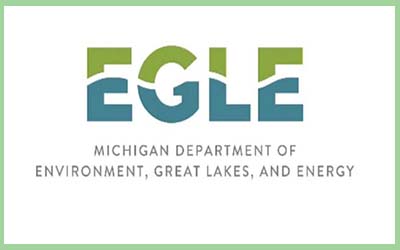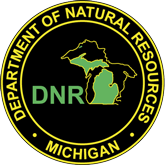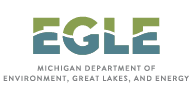April 12, 2023
Contact: Joanne Foreman, 517-284-5814
From beneficial moths to blood-sucking sea lampreys, the NotMISpecies webinar series features a fresh lineup of invasive species along with some new methods to stop their spread. Join in each month to learn about some of Michigan’s least-wanted species and the work going on around the state to combat them.
The ugly
 The eel-like sea lamprey, often depicted as the poster child for invasive species in Michigan, is perhaps the scariest inhabitant of the Great Lakes. With rows of teeth in its circular mouth, this parasitic fish attaches itself to larger sportfish and literally sucks out their blood and internal fluids! We’ve invited Ross Shaw, communications and policy associate with the Great Lakes Fishery Commission, for Vampires of the Great Lakes: A review of the binational sea lamprey control program (9 a.m. Tuesday, April 25), to share more about the fascinating history of this species and the multifaceted control program that keeps populations in check. The eel-like sea lamprey, often depicted as the poster child for invasive species in Michigan, is perhaps the scariest inhabitant of the Great Lakes. With rows of teeth in its circular mouth, this parasitic fish attaches itself to larger sportfish and literally sucks out their blood and internal fluids! We’ve invited Ross Shaw, communications and policy associate with the Great Lakes Fishery Commission, for Vampires of the Great Lakes: A review of the binational sea lamprey control program (9 a.m. Tuesday, April 25), to share more about the fascinating history of this species and the multifaceted control program that keeps populations in check. |
The bad (but beautiful)
 Did you know that many invasive plants found in natural areas today originally arrived as ornamental garden plants? Some garden professionals and community members have committed to stop selling and using ornamental plants with invasive tendencies by signing on to the Go Beyond Beauty program. Shelly Stusick, program specialist at the Northwest Michigan Invasive Species Network, joins us for To infinity … and beyond (beauty)! Highlighting a statewide ornamental invasive plant outreach program (9 a.m. Thursday, May 25). She’ll share the benefits of partnering with local nurseries, garden centers and concerned citizen groups to provide ornamental invasive species education. Did you know that many invasive plants found in natural areas today originally arrived as ornamental garden plants? Some garden professionals and community members have committed to stop selling and using ornamental plants with invasive tendencies by signing on to the Go Beyond Beauty program. Shelly Stusick, program specialist at the Northwest Michigan Invasive Species Network, joins us for To infinity … and beyond (beauty)! Highlighting a statewide ornamental invasive plant outreach program (9 a.m. Thursday, May 25). She’ll share the benefits of partnering with local nurseries, garden centers and concerned citizen groups to provide ornamental invasive species education. |
The just plain bad
 Plenty of Michigan’s beech trees are stressed by beech bark disease, and now a microscopic worm is attacking through their leaves. Simeon Wright, Michigan Department of Natural Resources forest health specialist, takes an in-depth look at beech leaf disease in Life’s a beech! Another disease is threatening Michigan’s majestic giants (9 a.m. Wednesday, June 14). Join him to discover the potential impacts of this emerging disease, what’s being done to address it, and how to spot the symptoms of beech leaf disease on your trees. Plenty of Michigan’s beech trees are stressed by beech bark disease, and now a microscopic worm is attacking through their leaves. Simeon Wright, Michigan Department of Natural Resources forest health specialist, takes an in-depth look at beech leaf disease in Life’s a beech! Another disease is threatening Michigan’s majestic giants (9 a.m. Wednesday, June 14). Join him to discover the potential impacts of this emerging disease, what’s being done to address it, and how to spot the symptoms of beech leaf disease on your trees. |
At last – the good
 Classical biological control returns with a showdown between invasive swallow-wort vines and Hypena opulenta, a defoliating moth that only develops on invasive swallow-worts. We’re bringing back Marianna Szucs from the Department of Entomology at Michigan State University for Can this moth help save monarchs? Swallow-wort biological control efforts in Michigan (9 a.m. Thursday, July 13). She’ll explain how invasive swallow-wort vines, kin to native milkweed plants, are disrupting the life cycle of monarch butterflies and discuss the complexity of research efforts to establish Hypena opulenta as a swallow-wort biocontrol agent in Michigan. Classical biological control returns with a showdown between invasive swallow-wort vines and Hypena opulenta, a defoliating moth that only develops on invasive swallow-worts. We’re bringing back Marianna Szucs from the Department of Entomology at Michigan State University for Can this moth help save monarchs? Swallow-wort biological control efforts in Michigan (9 a.m. Thursday, July 13). She’ll explain how invasive swallow-wort vines, kin to native milkweed plants, are disrupting the life cycle of monarch butterflies and discuss the complexity of research efforts to establish Hypena opulenta as a swallow-wort biocontrol agent in Michigan. |
How the webinars work
Monthly webinars from the Michigan Invasive Species Program provide an inside look at efforts across the state to prevent the introduction and spread of invasive plants, insects, animals and diseases.
Each hourlong session introduces experts with hands-on experience in invasive species research, management and prevention, who provide current information on threats to Michigan’s land and waters. Question and answer sessions and links to resources help attendees get the most out of each presentation.
Watch previous sessions
If you aren’t always able to join live sessions, you can catch up on topics you might have missed, including how to comply with Michigan’s invasive species prevention laws for boaters, successful phragmites management in the Upper Peninsula and helpful tips for managing invasive species in your backyard.
Recorded versions of all previous webinars are available on the NotMISpecies webpage.
Michigan’s Invasive Species Program, a collaborative effort of the departments of Natural Resources; Environment, Great Lakes, and Energy; and Agriculture and Rural Development, coordinates and supports invasive species initiatives across the state and provides support through the Michigan Invasive Species Grant Program.
/Note to editors: Accompanying photos are available below for download. Photo attributions and suggested caption information follows.
Sea lamprey: Invasive sea lamprey use circular rows of teeth to latch on to fish and suck their blood. Photo courtesy of EGLE.
Barberry: A worker displays a branch of invasive Japanese barberry from a plant found in a forest. Photo courtesy of Huron Heartlands Invasive Species Network.
Withered leaves: Thick bands of leaf tissue may turn yellow late in the growing season. DNR photo.
Hypena opulenta: The hypena opulenta moth is being studied as a biological control agent for invasive swallow-wort vines. Photo courtesy of Dr. Marianna Szucs, Michigan State University./ |













